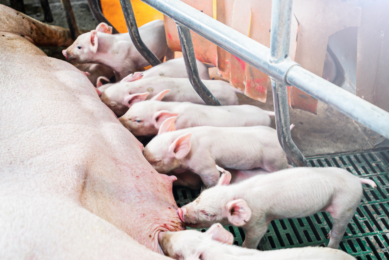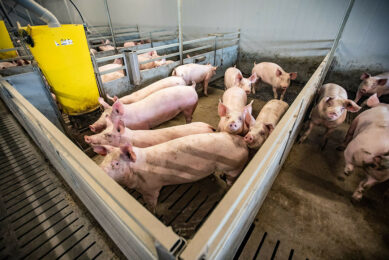Around the world in 11 pig farms

Through the year 2018, Pig Progress visited various leading farms all over the world again. We took a look at some very interesting projects in China and Vietnam and learnt on-site about the latest developments at several European farms.
Just a quick disclaimer – this is not a Top-11 of best swine farms according to Pig Progress. Over the last few years, we have made similar wrap-up of the year’s farm visit features, and funnily enough, they were shared by some on social media with comments like: ‘These are the 10 best swine farms of 2017’.
Well – no. That’s not exactly what it is. What is it then? Every year we spend a lot of careful attention covering interesting, modern and transparent swine farms that have a story to tell and that have been kind enough to share a glimpse of their farm with us. And through us, the rest of the professional swine producing world can learn as well, we hope.
Here we go with a recap of this year’s selection – and do click through on the links if you like to know more about the farm!
 Tan Uyen Farm, Vietnam: Sows come and go
Tan Uyen Farm, Vietnam: Sows come and go
The Vietnamese swine market can at times be volatile in terms of market prices. That is why sometimes it is better to scale down in case the market situation is not that fantastic. At the moment of visiting Tan Uyen farrow-to-finish farm, near Ho Chi Minh City, Vietnam, the farm had decided to run at half capacity. At the time, roughly 600 out of 1,200 sows were present. Apart from being flexible in sow numbers, the farm owner showed great skill in making own types of curtain systems and integrated the swine farm with pomelo production.

 Bosgoed-Brink Farm, the Netherlands: Weighing finisher pigs
Bosgoed-Brink Farm, the Netherlands: Weighing finisher pigs
The weighing and sorting of finishing pigs has been made a lot easier at Bosgoed-Brink farm. For welfare reasons, when constructing a new finisher farm, the owners decided to go for large groups of animals (over 300 per room). Nedap weighing and sorting equipment was installed to oversee and manage the phase. Colleague Erik Ordelman had an interesting look behind the scenes.

 Vuorinen Farm, Finland: Being creative pays off
Vuorinen Farm, Finland: Being creative pays off
Being a farmer in Finland these days is not easy, wrote correspondent Chris McCullough after having visited a swine facility in that country. After all, due to the ongoing EU-wide ban on agricultural produce from Russia, a large market has disappeared from sight for Finnish producers. He paid a visit to swine farmer Mika Vuorinen, who has a 1,700 wean-to-finish facility near Jalasjarvi. The trick to deal with the market situation is by being creative, he explained.

 Yangxiang Farm, China: Spectacular pictures
Yangxiang Farm, China: Spectacular pictures
Arguably the best-read feature ever to be run in Pig Progress was the production by colleague Kees van Dooren to the brand new multi-storey pig houses near Guigang, Guangxi province, southern China. He observed the 7 and 9 storey houses, which each keep 1,000 sows per floor, learnt how animal health has been kept in mind during the design and he explained the future growth plans of owning company Yangxiang, which is growing at an extremely rapid pace.

 Kropp Farm, Germany: Group insemination
Kropp Farm, Germany: Group insemination
Conventional is to inseminate sows while they are stood in insemination stalls, but this is where Tim Kropp found that things can be done differently. On his farm near Diepenau, Lower Saxony, Germany, he just does his insemination work in between group housed sows. He decided to go for that approach by accident, but it actually worked for him, colleague Erik Ordelman observed. Don’t miss the video of him doing his breeding job.

 Vissan Farm, Vietnam: City going into pigs
Vissan Farm, Vietnam: City going into pigs
It is in the interest of Ho Chi Minh City that its inhabitants get decent food at regular times. For that reason, the city decided to be the driving force behind Vissan, a Vietnam-based integration of 11,000 sows which provides pigs and pork that mostly can be found in Vietnam’s largest city. Pig Progress visited a new, large-scale project in Binh Thuận province and also learnt on the fly why most pigs need to be slaughtered at midnight…

 Fuling Black Pig Farm, China: Pop-up farm houses
Fuling Black Pig Farm, China: Pop-up farm houses
A completely different kind of pig farm, visited shortly before African Swine Fever emerged in China. Fuling Black Pig Farm, about 2 hours east of Chongqing, breeds black pigs from a local breed as they do extremely well in the market. The farm has many rather unique aspects, including the surface (sand) as well as a crop growing rotation system in farm houses temporarily uninhabited by pigs. Interestingly, owner Li Hainin invites local farmers to join him in the black pig project, by offering to build ‘pop-up’ farm houses, which can be built in only 5 days.

 Tianzow Breeding, China: Next step in breeding
Tianzow Breeding, China: Next step in breeding
How fast the developments in China are going is well exemplified by Tianzow Breeding, a pig breeding firm that was established in 2004 but has become very large over the last few years. Proudly, the company’s president, Yu Ping, introduced his new ‘Yu’s Design 4.0’ at the International Pig Veterinary Society (IPVS) Congress in Chongqing, which encompasses many different practical applications, related to innovations and sustainability. Colleague Rosie Burgin had a look around at the company’s Wusheng GGP farm in Sichuan province.

 Reinke Farm, Germany: Liquid fermented feed
Reinke Farm, Germany: Liquid fermented feed
Over the last few years the concept of controlled fermentation of liquid feed has been gaining ground in Germany. For instance, the companies Weda, ForFarmers and Dr Ferm have been playing a role in this development. Correspondent Norman Dunn travelled to Holtrup in Lower Saxony to find out how the concept works at Reinke Farm. This mixed farm has a pig finishing facility with a capacity of roughly 4,500 places.

 Shute Farm, United Kingdom: New Genesus breeder
Shute Farm, United Kingdom: New Genesus breeder
For this farm visit, correspondent Stuart Lumb travelled to the far west of the UK: Cornwall. The Shute farm recently decided to convert to become a nucleus facility for Canadian breeder Genesus. As the farm changed to Genesus, the farm also converted from Electronic Sow Feeding to free access stalls as it suited the owners better.

 Heinz Farm, Germany: Keeping grower pigs on straw
Heinz Farm, Germany: Keeping grower pigs on straw
At the recently held EuroTier, livestock equipment company Big Dutchman launched its Xaletto concept – a thought-through and balanced management scheme where grower pigs can be held on straw. Interested, colleague Kees van Dooren travelled to Lower Saxony’s Cloppenburg district, Germany. At Heinz Farm, he found out that, when certain other conditions are met, the straw and the manure together can start composting with the animals on top. That way, with predictable results, the problem of ammonia emission can be tackled at its source.

Farms from the Americas?
Last but not least, before you ask: “What about America? Haven’t seen any farm from there!” I know, this list doesn’t include any from the New World this year. That doesn’t mean we didn’t try… In fact, I did visit an inspiring farm in the Mid-West and a feature was ready for publication when cooperation was suddenly withdrawn for reasons lying outside Pig Progress. I can only say that I sincerely hope that in 2019 this feature can still be published as it was well worth the effort.
Keep you posted!












